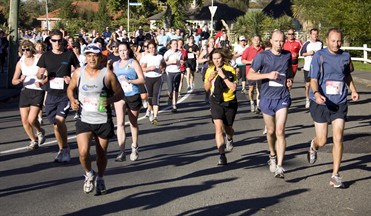 Christchurch is New Zealand's second largest city,
with a population of 348,435 in 2006. Between 2001 and 2006,
the city's population grew by 7.5%.
Christchurch is New Zealand's second largest city,
with a population of 348,435 in 2006. Between 2001 and 2006,
the city's population grew by 7.5%.
Read the full demographic profile for
Christchurch [PDF].
Our ageing population is growing
Like many developed countries, New Zealand's population is
ageing. In 2006, the national median age was 35.9 and is
expected to rise to 39 by 2026. People over 65 made up 12.3%
of New Zealand's total population, while 21.5% of the population
was under 15.
Christchurch is an ethnical diverse city
In 2006, 75.4% of Christchurch residents identified themselves
as NZ European, compared with 67.6% nationally. "NZ
European" includes people from many groups - British, Irish,
South African, Australian and many European nations. Asian
people made up the next largest group with 7.9% of the city's
population compared with 9.2% nationally. The Asian population is
also made up of a number of different nationalities, including
Japanese, Korean, Chinese, Thai and Malaysian. Maori make 7.6% of
the population (14.7% nationally) and Pacific Islanders 2.8% (6.9%
nationally).
Christchurch has some unique demographic characteristics around
gender and household composition
In 2006, 52% of the Christchurch population was female. In
the age groups up to 25 years, males outnumber females. From
the age of 25 onwards, the number of females in each age group was
higher, with females making up 60% of residents aged 70 years and
over.
Christchurch has a higher proportion of single person
households than the national average, reflecting the larger number
of elderly people living in these cities. In the 1980s, a
couple with at least 1 child was the dominant household type in
Christchurch with 35% of all households in this category. By 2006,
households containing couples with at least 1 child (27%) were
overtaken by those with couples without children (28%) and there
were almost as many households of people living alone
(25%). In 2006, one-family households made up 66.2% of all
households in Christchurch. For New Zealand as a whole, 69.1%
of households contained one family, and 23% were one-person
households. The average household in Christchurch had 2.5
people, compared with an average of 2.7 people for the rest of the
country.
Impact of the Earthquakes on Christchurch people
Understanding the range of factors that contribute to people's
health can help us develop policies and plans to improve health and
wellbeing. The earthquakes of 2010-11 damaged homes, buildings,
roads, water and wastewater systems, and community facilities such
as pools, libraries and open spaces. The central city will need to
be substantially rebuilt, and whole suburbs will need to be
abandoned. It was lucky that the consultation for this City Health
Profile was completed shortly before the 4 September 2010
earthquake. This provided a snapshot of what people thought about
living in Christchurch and what they wanted to see changed. What
they told us was consistent with many other consultations
undertaken in recent years, including for the Greater Christchurch
Urban Development Strategy.
For many of us the earthquakes have 'shaken the ground we stand
on' and this is has not just been physically. Our whole
lives have changed as we navigate new homes, new workplaces, new
schools, new daily schedules and traffic jams like we have never
experienced before. The feedback from this consultation can help
remind us of what we valued before the quakes and guide our
planning for the future.